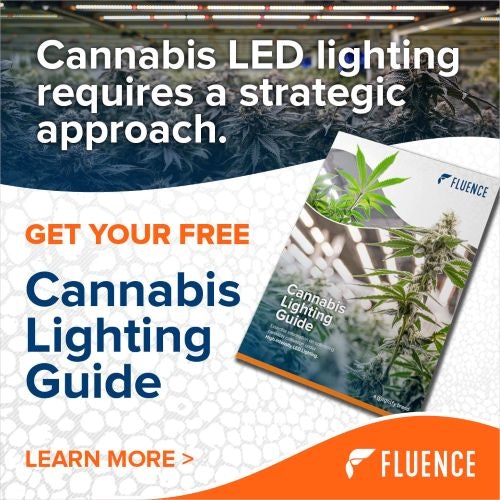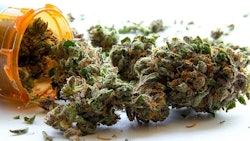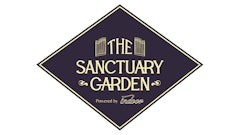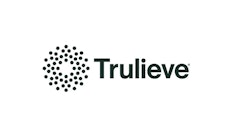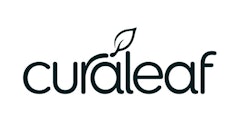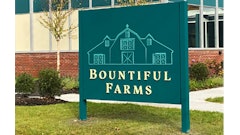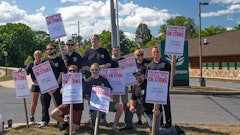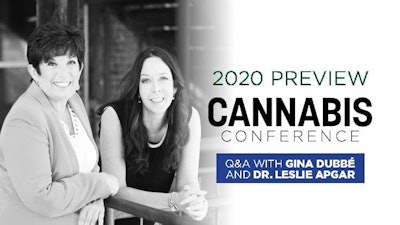
Dr. Leslie Apgar and Gina Dubbé will be the first to note that their dispensary adorned with houseplants, hardwood floors and white leather furniture is quite a far cry from the overflowing ashtrays, blacklight posters and milk-stained Fruit Loops bowls a cannabis customer might find in their underground dealer’s basement.
The co-founders of Greenhouse Wellness in Ellicott City, Maryland, are “‘Doing Dispensary Their Way,” as Cannabis Dispensary shared on its January/February 2020 magazine cover. Together, Apgar, who serves as medical director, and Dubbé, who is CEO and lead investor, even subvert many of the norms of the legal dispensary business.
RELATED: Greenhouse Wellness: 'Doing Dispensary' Their Way
“We invest in the community,” Dubbé told writer Jolene Hansen. “We’ll teach. We’ll go into hospitals, hospice and doctor offices.”
Greenhouse Wellness takes a medical approach to cannabis—Apgar is an OB-GYN, Dubbé a serial entrepreneur who co-founded TheraPearl for sports injuries. In creating a business around wellness, one thing they do is pay close attention to the needs of women customers and employees. This Women’s History Month, we asked them about how other women in the industry can succeed.
Cannabis Dispensary: What unique perspectives do women bring to the cannabis industry?
Gina Dubbé: I believe that women bring a level of compassion and caring because women are the primary caretakers, usually, for a family. While 50% of our patients are women, 80% of the women in America are the caregivers to the family. So, we believe strongly that women have a voice in cannabis.
Dr. Leslie Apgar: Well, obviously as an OB-GYN, women have been the target of my audience for most of my career, and it is amazing how much they silently suffer. As, usually, the entry point for the family in the healthcare world, it's important that they get their needs met. And most of the attention in big pharmacy is not toward women. So, if we can direct the lens at our female patients, I think we'll be doing the entire planet a service.

CD: What are some of the challenges that women face in the cannabis industry, and how have you both worked to overcome those obstacles?
LA: It’s a couple of things, both from owning and operating the dispensary and not being privy to the same deals that are given to some of the guys in that industry—there's definitely a boys club, which is the way the world works, I guess. There is still a lot of that in medicine and in a lot of industry—and cannabis is no different—but Gina, especially in the very early days, would have to fight to get the same deals that others were getting. And there was really nothing different about them over us, they just were men. Funny enough, we were paying our bills on time, and other people weren't, necessarily, and we still weren't able to get the same deals.
GD: We actually bought more and got worse deals, and it wasn't until we became astute enough to recognize that and push back and say, 'I'm not going to buy from you unless I get the same deal.' We were taken advantage of.
LA: It just seems that the attitude toward women in business is just maybe condescending. Or we've been met with skepticism since we started, and we were told, 'No, that'll never work. You girls just don't know what you're doing.' And there's two women sitting in front of them that have owned their own businesses, have been very successful in serial business, and you wouldn't say that to a guy. So, that's one part of it. The second part of it is the fact that the industry itself—if you walk into a dispensary—is not welcoming to women. In fact, because it is so dominated by men, the entire thing from stem to stern is really directed toward a male client.
What we wanted is that to function in a place where it was appealing to anybody, of any color, any creed, any gender, any age. We wanted it to be all-inclusive, and we wanted to change the narrative. We wanted to change it up. We wanted it to be unexpected. We wanted it to be what Gina and I would like to see if we walked into a dispensary.
GD: So, if you walk into our dispensary, you see white leather furniture, quartz countertops, chandeliers, fresh flowers, fresh music, natural light—everything that we feel a woman appreciates and wants. Now, men want that, too, but it is a nontraditional dispensary.
LA: Men don't even know what they're missing until they see it pointed out to them, oftentimes, because a lot of the guys that will come in will say, 'Wow, I've never been here before. This place is really nice.' But it would never occur to a male designer, necessarily, to think of the different dimensions that Gina and I thought about when we decided how to outfit and furnish our dispensary. So, the approach is way more female-centered, or female-focused, but it's not exclusive of anything else. It's just that we wanted to make women feel welcome.
GD: We wanted it to be like a home, a safe space.
LA: Yeah, and then the other thing is that the products are absurd. I mean, who names these strains? Pootie Tang? AK—
GD: AK-47.
LA: Yeah, it's absurd. This is medicine that is still being classified and categorized in locker-room, back-alley ways. We have to elevate this industry in all things, and in all ways.
GD: So, we named our strains—our in-house strains—Easy Like Sunday Morning [for example] because we felt that that captured how it made you feel, as opposed to a title that had no relevance to what the effect would be.
LA: It's been interesting trying to bring in products that were appealing to women and not off-putting, really, which is the bottom line. And then we saw such a gap in what was available that we decided to make our own line of products for women, which we ended up doing, which is called Blissiva. That has been incredibly successful for all the sexes. We've got men who come in, and they'll sit there like, 'Can I have it, too?' I'm like, 'Of course, you don't need a vagina to use it.' It's just that we developed it specifically for women, but the men are loving it, too. … Men don't necessarily think about how something smells or tastes or looks or feels in their hand, versus a woman, who's going to be really particular and notice those things. So, we're just trying to be all-inclusive and think outside the box and not listen to the people that keep telling us that we're wrong.
GD: I'm not sure you're aware, but we wrote a book called High Heals—H-E-A-L-S. It is a love letter to women. It is a message of empowerment. It's a message of, 'Hey, we didn't know what we were doing when we started out, but you can start, too.' It's encouragement and love for those who follow us."
CD: Would you say that the fact that this is a new industry and that some of it came from underground markets is a help or a hindrance to women, or does it just depend on the market or other factors?
GD: I think it depends on the market. In a truly medical market, Leslie and I both agree that we love the fact that Maryland tests everything. We know exactly what's in our product, we know exactly what our patients are getting. The underground market doesn't get you that.
LA: Now, that said, the underground market is full of very, very passionate individuals, and I have to say I appreciate their passion because it's helped to get us a medical market, at least.
However, I would really like to see the recreational market embrace the evolution of cannabis as medicine and to recognize and value the fact that it can be used and appreciated in many different ways, because sometimes people in that market come in with pretty rigid feelings and beliefs about how it should be, and how they should be allowed to have home grows or whatever.
Gina and I both are not against the recreational market at all. What we are adamant and very passionate about ourselves is to create a safe supply and a steady and consistent supply of true medical cannabis. The recreational market, in my experience, has not put the focus as much into CBD as it has in THC. And when you really get down and study the pharmacology of this plant and understand what's happening in the body, really the take-home message is that the magic of CBD with a little bit of THC—you don't need a lot to get the job done. I like a very robust cannabinoid profile. I love terpenes. I can't wait until we get more data to really give us some support in making the recommendations that we make. But I would just ask the recreational market to continue to have an open mind as we try and make cannabis as safe and predictable as possible.
CD: Have you seen any recent research that certain terpenes or cannabinoids have different effects on women than men or anything like that?
LA: Yeah, there's data that cannabis affects men and women differently, for sure. There's definitely that data. But the breaking down to individual cannabinoids and terpenes is really difficult. And it's going to continue to be very difficult.
GD: As a point of reference, Dr. Apgar has a specific article in a medical journal about endometriosis and cannabis, and you have a new article coming out this month, I believe.
LA: We actually are being featured in a journal for physicians by physicians that is using Greenhouse Wellness as a spotlight of sort of the standard by which others should be judged, because we run it like a residency program, so it's truly, truly medical.
Then, the second part of that is we have a case report of an individual who used cannabis to get her completely off of opioids. She has a congenital anomaly that she was born with, and she's had a couple of really big surgeries and has been addicted to narcotics twice as a result. The first time she got herself off opioids without cannabis. The second time, cannabis was now legal in Maryland, so she was able to use it. And the difference is just absolutely striking. So, it's good that we're getting out there and that we're able to share whatever information that we are privy to.
Clearly, my focus is going to be on researching what is unique about the female anatomy and different cannabinoids and terpenes. For right now, we've been watching and reading everything that we can get our hands on and making some educated—I'm not going to call it a guess—but educated decisions on what to do with our cannabis line. And we've been overjoyed. Our patients, really—what it's all about—they are the ones who have been overjoyed with the reaction. Some of it might be intuitive, but there's been a lot of research into anything printed, anything spoken, anything I can get my hands and ears on, to come up with the different formulations for women.
CD: What advice do you two have for other women who are looking to advance their careers in this industry?
GD: Follow your dreams, follow your passion, be respectful of your inner voice that cautions you, but jump, because we find that women need a little more encouragement, a little more love, and this is our message to you all. If we can do it, you can, too. We're your biggest cheerleaders.
CD: What do you hope attendees of Cannabis Conference 2020 will bring back to their business from your session on how to create a best cannabis company to work for?
LA: I think the most important thing is to be yourself, that you have to be true to who you are as individual and as a business owner. Gina and I have always held our motto very near and dear to our hearts and have followed that at every chance we have. But truly, it's to be kind, and if, given the opportunity to be anything in the world, if you choose kindness, everything just has blossomed for us. We've been very lucky. So, I think anybody who opens up a business will bring something spectacular and unique to it. The trick is to hold onto whatever it is that is near and dear to your heart and wake up and follow that passion every day.
GD: Amen, sister.

